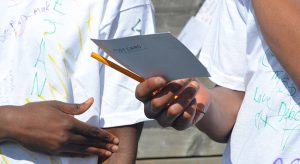There are 801 children living with HIV in the UK. The charity Children’s HIV association (CHIVA) works to ensure young people living with HIV have the knowledge, skills and support needed to live well and to achieve their greatest potential. To mark World AIDS Day on December 1st, we spoke to members of CHIVA’S youth committee about what it’s like to be a child growing up with HIV in the UK. You can follow them on Twitter @Freedom2spk.
CHIVA’S youth committee are a lively and passionate bunch. We talk over Skype and they’re buzzing with ideas and stories.
I’ve called during one of their weekend retreats. The committee meets regularly as part of the charity’s participation strategy and this group of young people sit alongside the executive committee. Organisations often say they’re youth led, but you get the sense that this one really is.
“There’s not enough education,” one young person tells me.
It’s the overriding message that permeates our conversation. And education needs to be at the heart of change.
“People need to know that we’re not this danger to society, that we are normal and can live long healthy lives and this should be taught in and throughout schools.”
We talk about what it’s like growing up with HIV. A recurring theme is dealing with stigma. Although things are improving, they tell me horror stories of misinformation in schools and colleges.
“It’s particularly upsetting when the misinformation comes from people you look up to, like teachers giving wrong information,” another of the young people tells me.
“Or when HIV is discussed in class and you can be upset by your friends’ reactions. It can bring down your confidence.”
The same young person tells me how in class they endured comments such as “People with HIV should be made to drink bleach,” or “People with HIV give it to you by touching you.” This was in a top set biology lesson and the teacher was laughing along with the students.
“Whilst everyone was laughing, I was nearly crying.”
So for this group of young people, World AIDS Day is particularly important as it’s a chance to educate as well as reflect.
“It shows what a journey we’ve been on and it allows everyone to come together. It provides food for thought.”
Another young person adds, “It’s a chance to teach non-positive people, a chance to be open, a chance to say AIDS is not about death.”
But above all, “It’s a time for remembrance, at the same time as being a reminder of what’s to come, what battles are left to fight.”
For all the positive developments there are indeed many battles ahead. Not least the issue of representation, especially with so few portrayals of people living with HIV on television.
But one show has stood out over the years – MTV Shuga. With its focus on emotional well being and positive education, it has achieved a wide audience around the world, as well as launching the career of Lupita Nyong’o. But for the young people on CHIVA’S youth committee, there’s not enough depth to the show, it doesn’t connect the journey.
Which is why they’ve been involved in the making of a new film, Life Growing Up, which is being launched to coincide with World AIDS Day.
“We got together with storytellers and made it into a film. These are the positive portrayals we want to see. It’s our reality, our real-life experiences.”
The film explores issues such as telling a partner about HIV, the challenges of medication adherence and life-long clinic attendance. Much of the film is verbatim so there isn’t just one narrative voice, it highlights the plurality of their experiences.
But there are some things that are the same for everyone. And that is the concern of transitioning from paediatric services into adult services.
Abi Carter, CHIVA’S participation officer says, “a lot of young people need support post 18. Their lives change dramatically, they don’t live at home, they start relationships so find themselves talking about their HIV more.
“There’s pressure on paediatric clinics to move them on to adult services, and there’s worrying data that shows these young people get lost in adult services. They don’t get the same level of support, like reminders to take medication or to attend appointments.
“Some clinics try to manage this transition in a staged way, with clinics for 18 to 25-year olds. There are examples of good work, but it’s inconsistent across the country.”
This disparity of care concerns the whole group. There are some excellent pockets of practice – one girl says how her nurse texts her with updates to see how she is: “it really built my confidence.” But this isn’t the same for everyone. It can be a daunting experience keeping up with your doctor.
“We’ve heard of children in rural areas who aren’t getting the check ups they need. They tell us they feel isolated.”
To combat this, the young people set up a website If Only You Knew. It’s for young people, by young people. And they would like more doctors and nurses to share this with their clients.
So World AIDS Day provides an opportunity to for the whole world to remember. And for these young people it’s a chance to speak up and be heard, as well as reflect.
“So now, when I look back I realise that it has been really difficult, it wasn’t easy being stopped from going to sleepovers because of meds, or running away from boys because I didn’t want a boyfriend in the fears of being rejected if I told them. But if it wasn’t for my HIV I wouldn’t have met my best friends, people who really understand me.”






